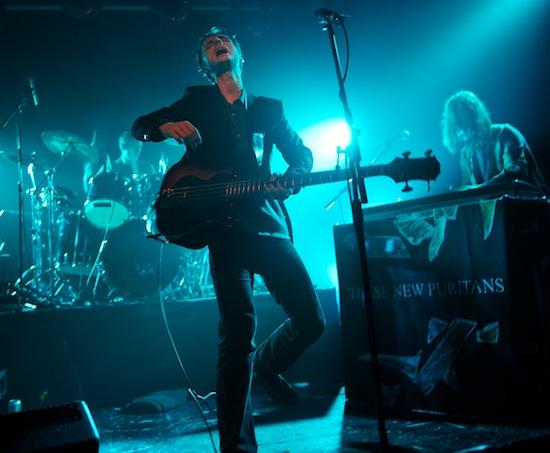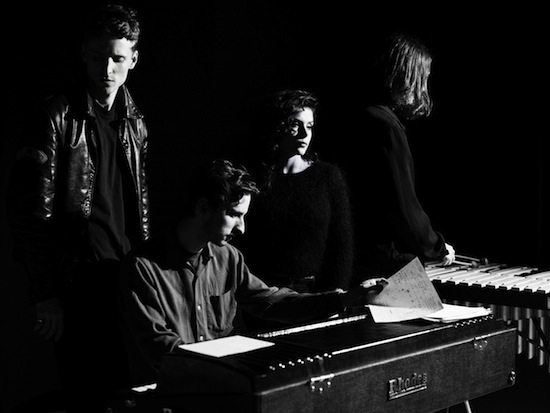Everyone listening to music in the 21st century has unwittingly become an amateur taxonomist. Everything has to be categorised, arranged and placed in the musical filing cabinet. What style is this? What scene does this come from? What’s its genus? What’s its species? Some sort of hybrid, perhaps. Anyone writing about music is culpable for this spread of taxonomic fever, of course. Observe some of the emptier labels that have been bandied around in print in the last few years: ‘Alt-classical’, with its ludicrous implication that a concert at Carnegie Hall might be considered a bit underground. EDM: ‘Electronic Dance Music’, as if there was a period in the 90s when everyone went to harpsichord clubs. Or something.
When a record as tricky to pin down as These New Puritans’ Field of Reeds emerges, there’s obviously a rush to define it neatly and tidily. Rather like Nico’s The Marble Index, it’s a record that sounds simultaneously ancient and futuristic, with its low, sombre brass arrangements and haunted vocals alongside electronic rifts that open periodically in the textures. There’s a sparkle in the execution, recording and ‘feel’ which doesn’t quite chime with contemporary pop.
The most frequent conclusion in reviews so far has been that it is a work derived primarily from contemporary classical music, which makes a kind of sense for an album so dominated by piano and orchestral instruments. TNP’s Jack Barnett is not happy with this, however. He’s not happy to be placed in any kind of pigeonhole. For instance, during our interview, he’s relieved I don’t press any questions on him about being from Essex – "The Quietus are always going on about that" – presumably tired of this search for meaning/category in his provenance.
Barnett’s evasiveness has earned him a small reputation as "difficult", but I don’t see him like that. He has a diffident charm and his perceived spikiness is a genuine artistic focus and thoughtfulness. After our interview, he sends a message stressing that the trappings of the classical music world: scores and parts for orchestral musicians are, for him, "a red herring". Barnett doesn’t see the album as his "magnum opus", but a more personal, expressive piece of work than his previous two albums.
It’s something of a surprise. After all the words written about the album’s surface iciness, Barnett is keen to say that this album represents a return to a more direct way of voicing his emotions. "It’s like when I was younger. I’d get home from school and write songs on the guitar about how I felt," he says, "this album is kind of like that."
Field of Reeds sounds less like the work of a band, more like the work of a composer. Would you say that’s right?
Jack Barnett: When we started, These New Puritans was a narrow part of all the things I was doing, so it was a bit of an artificial thing, but more and more every idea I have goes into the band. We are a band; when we’re together we’re the same people, making music in the same way we did when we started out, driving around in a van, playing Chinese restaurants in Middlesborough. But even back then, the way we made music had nothing to do with the way bands usually make music.
And that means avoiding the usual pop structures – verse, chorus, bridge – that’s something quite conscious?
JB: Not at all. I’m really just working on instinct. It’s a big accident. But I like it when songs take unexpected twists, where things spin off into a different world. And that’s something that you can’t do if you’re jamming things out as a band – we’ve never done that. That’s why I like composed music more than improvised music, because you can get those sudden changes.
Those juxtapositions of different musical materials is a very ‘contemporary classical’ way of thinking.
JB: It’s not classical music. It’s just not always loop-based music, like a lot of popular music is. Instead, there’s processes happening over a long period of time.
When people say, ‘it’s classical music’, I think that’s a way of saying, ‘I don’t understand this’. But really, this is a melodic album. It’s about tunes. It always confuses me when people say, ‘this is really dissonant and terse’.
But isn’t there something to be said for ‘difficult’ music? Something that asks for some input from the listener?
JB: We’re always frustrated when people say our music is ‘difficult’. We don’t see it like that. I think this music is really hopeful. But maybe it’s worth sticking up for difficulty, seeing as so much creativity in the world has been replaced by… videos of cats.
The album has inspired some strange interpretations to be honest – we had a long letter from a French molecular biologist saying he thought it was about evangelical Christianity.
You don’t see it as classical music, but you did work with classical composer Michel van der Aa on the album.
JB: We’d worked with [conductor] André de Ridder, who is now part of the These New Puritans world. And we worked on the ‘Hidden Live’ shows, working with an expanded ensemble, ten woodwind players, live foley, percussionists, three vibraphones. And André said, ‘if you could collaborate with anyone, who would it be?’ I immediately said, ‘Michel van der Aa’, and he said, ‘that’s funny, I’m working with him on his next opera’. So I ended up going to Amsterdam with five or six ideas to work on with him.
I do hear a connection between your music and the ‘Dutch Minimalist’ music of someone like Michel van der Aa, or his teacher Louis Andriessen. That combination of something very rhythmic and those acidic harmonies.
JB: Yes. I wonder, on that track [‘The Light In Your Name’] how many people would be able to pick out the bits I did and the bits he did. I’m not sure exactly what it is, but we both felt our music had something in common.

His work moves very fluidly between live sounds and electronics – that’s something you share.
JB: We have this signature sound of recordings of breaking glass and knives; he has branches breaking. It made some kind of sense. I don’t like the idea of ‘cross-over’ though. I hate the whole corny classical/pop crossover world – I just wanted to work with him because I love his music, that’s all. We worked on some more tracks together – there might be an EP later in the year.
Field Of Reeds is interesting in that your voice is less present, more like another instrument. You don’t sound like you’re ‘broadcasting a message’ any more, it’s more internalised.
JB: I’ve lived every second of this music and it means so much to me, emotionally, more than any other music I’ve done. So I sang it the way that was natural. If I’d enunciated every word it would have been strange to me – it’s not the way I talk. I talk quietly.
So there’s a more personal quality to the words, but you also give the vocals to other singers.
JB: It was just obvious as I was writing that some songs were for other voices – it’s difficult to analyse, but musically it was important that there was a dialogue between male and female voices and that there should be a female perspective. I used to joke about writing myself out of the music, so I could just sit offstage and listen to it, but working with a great vocalist like [jazz singer] Elisa [Rodrigues] means I can let her specialise and just get on with what she’s good at.
How do you write? Do you use guitar, piano?
JB: Sometimes at the piano, with software, sometimes with pen and paper. I end up giving these arcane diagrams to musicians.

When you work with groups like the Britten Sinfonia do you end up having to translate that?
JB: Well, no, I give them a score. I don’t have to whistle the tunes. André’s great, in that he really understands the music – when you’re working with conductors that doesn’t always happen.
And how do you find working with orchestral musicians? There’s still something of a ‘work to rule’ culture in that world. A craftsman-like approach. You’ve said previously you’re a perfectionist, but a lot of orchestral players are disgruntled if sessions overrun.
JB: Yes, it’s hilarious. Orchestral musicians are way more like that than people in bands. They’re brilliant musicians, but occasionally I do come up against someone who arrives thinking, ‘this is a pop session, it’s going to be easy’. Then you see the look on their face change through the day, when you get them to play something a hundred times to get it right. But I think this frustrates people in the classical world too. That’s what was great about this album – we had the ensemble for two days and there was no worry about hours or anything like that – they just played until they physically couldn’t play any more. Amazing.
I mean, we’re the hardest working band in show business. We do 18 hour days, so it’s important to have a sense of humour.
There’s something unusual about Field Of Reeds, in that the arrangements are never "decorative"; the brass and strings are integral to the music.
JB: Yes, it’s always what the song demands. Usually, things like string arrangements are the last thing to be recorded, but we recorded those first. We started with the ensemble parts and built everything else around that.
Elton John has recently said he’s a fan of These New Puritans.
JB: I’m delighted. I’m an Elton fan, he’s an amazing songwriter and he’s on the ball with new music. I noticed on his new album there are tracks called ‘Dream’ too…
A coincidence…
JB: Maybe.
What other music do you feel a connection to? What about folk music? Not in the twee sense of some contemporary folk acts, but in the rawness of traditional music, the emotional directness.
JB: No. I mean, everyone’s talked about contemporary classical music, but to be honest when we were working on this album we were mainly listening to Steely Dan and Neil Young: craftsman-like songwriters. I love Aja and Gaucho – so harmonically brilliant.
That’s surprising. Steely Dan’s music always seems very dense with material to me. I don’t hear that in your music.
JB: I tend to listen to music that’s the opposite of what I’m doing. But inevitably you realise it isn’t the opposite. For instance, the song ‘Spiral’ I wrote imagining it sung by Donald Fagen. It’s essentially me doing a Donald Fagen impression. I was tempted to ask him to come into the studio and sing it.
Who else would you want to work with?
JB: I’m probably going to do some work on the next Current 93 album – I might do some sound design or a little detail… he’s folk, I suppose.
There you go. That’s exactly the kind of thing I was thinking of.
JB: Yes, like the folk music you find along the Atlantic coast – Flamenco for example. There’s always a darkness in that music. That really appeals to me.
These New Puritans are currently on tour. Full full details, visit their website


